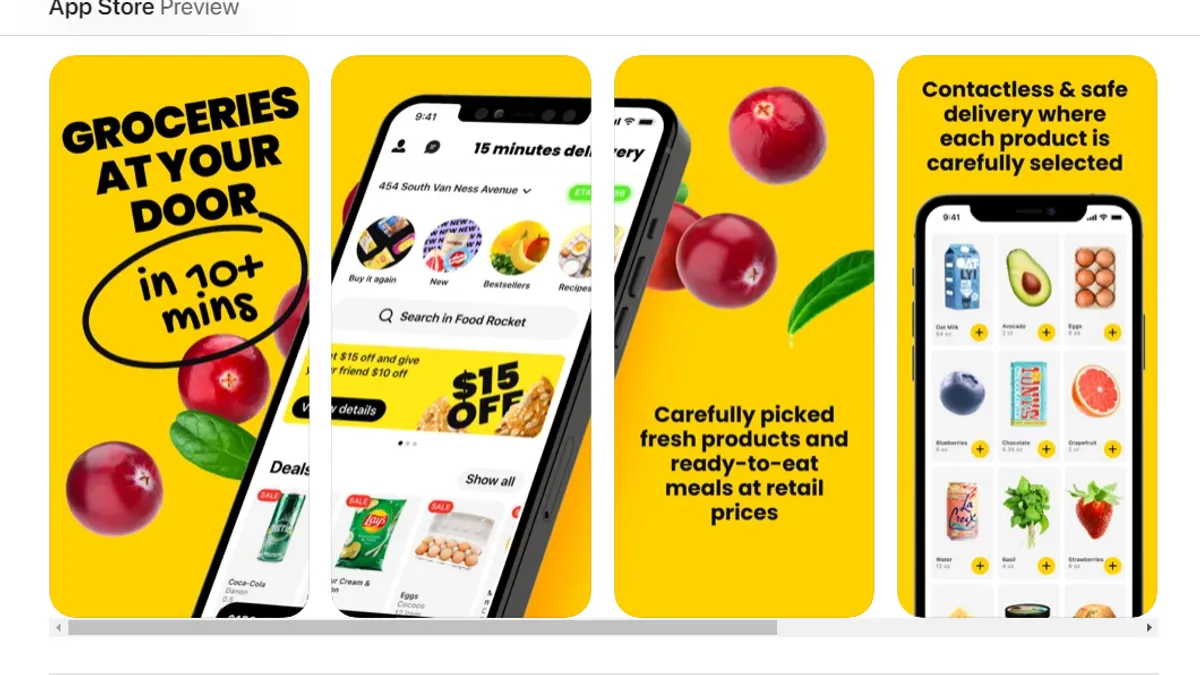Dive Brief:
- Ultrafast grocery delivery startup Food Rocket is planning to open a fulfillment center in Chicago this summer that will be co-located with a new Circle K convenience store and offer 15-minute delivery of products sold by both retailers, Food Rocket founder and CEO Vitaly Alexandrov said in an interview.
- Both companies said a deal isn't final yet and may not come to fruition. In addition, Food Rocket intends to launch operations in Boston; Los Angeles; Philadelphia; and Washington, D.C., this year, and will be looking for investments to support its expansion beyond what it has already raised from Circle K and other investors, Alexandrov said.
- Food Rocket and Circle K are both looking to tap each other’s expertise as the companies explore potential paths in the rapidly evolving quick-commerce arena.
Dive Insight:
While Food Rocket is planning to build a dark store immediately adjacent to a Circle K location, Alexandrov said the companies will individually lease their space and will run independent businesses. The cooperative arrangement in Chicago underscores the close connection the fledgling company has forged with Circle K, which is owned by Canadian multinational retailer Alimentation Couche-Tard.
Alimentation Couche-Tard injected an unspecified amount of money into Food Rocket, which currently provides service in Chicago and San Francisco, as the lead investor in the startup’s recently closed $25 million Series A round of funding. The investment falls under the convenience store operator’s $100 million Circle K Venture Fund, which has also invested in e-grocer Farmstead.
Alexandrov said Food Rocket plans to use its facility next to the Circle K store to assemble orders for the goods it stocks as well as for certain SKUs on the convenience store’s shelves. The e-commerce company will manage orders through its online platform and handle delivery using its workforce and fleet of e-bikes.
Food Rocket’s assortment is currently centered around fresh foods, and soon will also include prepared items like pizza and hamburgers, said Alexandrov.
Kevin Lewis, executive vice president and chief marketing officer of Alimentation Couche-Tard, confirmed the company’s interest in opening a Chicago location next to a Food Rocket dark store, describing the effort as a way to experiment with high-speed delivery as Circle K augments its primarily suburban fleet of stores with an urban presence.
“Obviously, the last six months hasn't been particularly kind to the quick commerce business. And so we're not surprised by that,” Lewis said in an interview, referring to the recent closures of several ultrafast delivery companies, like Buyk, 1520 and Fridge No More. “The real questions are, is there a real consumer promise here? Or is this just a bunch of hype that has gotten investors excited, but consumers don't care?"
Lewis cautioned that there is a chance the companies’ plans to develop the co-located facilities might not come to fruition. “If it turns out that this sort of strike of lightning in Chicago winds up working, great. Am I 100% convinced? No, because not all the paperwork is signed, and not all the leases are complete. But would I love to see it? Of course I would,” Lewis said.
Lewis added that Alimentation Couche-Tard concluded that it was better off partnering with a startup that specializes in high-speed delivery rather than trying to test the waters in a sector it does not have experience in.
“Rather than spending a billion dollars to figure that out, we've gone to people who we really like, and we like their interest in a sustainable business model, their relentless focus on the customer and a willingness to partner with us that says, ‘Hey, we both have some ideas around the business. What do we do?’” Lewis said, emphasizing that Circle K plans to share lessons it gleans from its partnerships across its fleet of more than 14,000 stores around the world, all of which are company-owned.
Lewis said he is treating Food Rocket much as he does Circle K’s groups of convenience stores in various parts of the country, adding that he believes the retail giant’s expertise in areas like customer acquisition and procurement are key assets that can benefit startups like Food Rocket and Farmstead.
Alexandrov said he also sees distinct advantages in linking up with a large retailer like Alimentation Couche-Tard.
“We decided to go into the deal with Circle K because it wasn't it wasn't just about the money. It was about some sort of partnership that will help us to improve the economics and make this business model profitable,” Alexandrov said.
If the co-location deal finalizes, it will be the latest instance of a quick-commerce company providing rapid delivery service for an established company. Gopuff partnered with Uber last year on an "everyday essentials" delivery service, and in March announced a deal with U.K. grocer Morrisons. Last fall, Germany-based Gorillas began delivering orders from warehouses co-located with several Tesco stores in Greater London.
Partnerships between grocers and quick-commerce firms could take root in the U.S. as demand for convenience delivery grows. But startups will have to contend with Instacart, which recently launched 15-minute delivery with Publix in Florida, as well as DoorDash, which is offering its DashMart dark stores and technology as a service to retailers.













